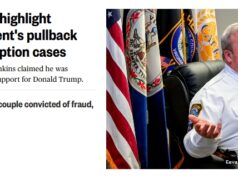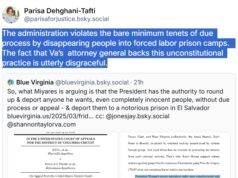From the Commonwealth Institute for Fiscal Analysis:
Virginia is For Second Chances: Landmark Expungement Reform Moves Forward
Virginia is on the cusp of passing landmark expungement reform, which could help extend a second chance to those with a past arrest or conviction record. At the core of the two key bills moving through the legislature right now — House Bill 5146 (Herring) and Senate Bill 5043 (Deeds) and — is a belief in redemption. If enacted, these bills would allow certain prior offenses to be shielded from public view if a person remains crime-free for a specified period of time. For a significant number of the estimated 1.6 million people in Virginia who have a past criminal record, this “clean slate” could provide greater economic security and opportunity.
As TCI has written about previously, expungement reform holds the power to change lives, but it also benefits families, communities, and the entire economy. Consider, for example, that nearly half of all children in the country have at least one parent with a criminal record, which is often a barrier to employment and education, making it easier for poverty to pass from generation to generation. But a recent study illustrated how expungement can help to break that cycle, finding that wages increased by more than 20% in the year after an individual’s criminal record was expunged. These reforms also represent an important response to the long-standing racial disparities in our criminal justice system, which have disproportionately impacted Black communities.
While Virginia’s special session is ongoing, and legislation continues to take shape, the discussion below summarizes the current versions of HB 5146 and SB 5043, which advance a set of complementary reforms.

HB 5146: Establishing Automatic Expungement
By introducing an automatic expungement process, HB 5146 represents a major step forward and, if enacted, would make Virginia a national leader in criminal justice reform. There are also signs this bill could become law in a bipartisan fashion: earlier this week, 59 members of the House of Delegates voted to support this legislation.
Overall, the legislation creates two distinct pathways to automatic expungement. First, for cases that are dismissed or where the defendant is acquitted, the court (absent particular circumstances) must immediately order the criminal record to be expunged and it must communicate that information with the person charged.
Second, with respect to convictions, HB 5146 provides a comprehensive and specific list of offenses, including — as the large majority of states do — certain misdemeanors and felonies, which are to be automatically expunged after eight years from the date of conviction or release from incarceration, whichever is later, if the person has remained crime-free.
HB 5146 sets forth a general rule that people do not have to disclose to employers or educational institutions information about a prior arrest, charge, or conviction once the criminal record has been expunged. In addition, HB 5146 requires Virginia’s court system to make sure, following an expungement, that personally identifying information relating to the offense does not appear in a judicial opinion, or in an appellate court, circuit court, or district court case management system.
SB 5043: Expanding Petition-Based Relief
The approach of SB 5043 is to broaden the scope of current law by adding certain categories of convictions that would be eligible for expungement by petition. Virginia’s existing law — one of the most restrictive in the entire country — generally provides no process by which past convictions may be expunged.
SB 5043 would change that by allowing certain convictions related to alcohol, tobacco, and marijuana possession to be expunged, but only after a five-year waiting period and upon payment of any outstanding court costs. The bill would also permit the expungement of convictions for non-violent offenses if the person has received a simple pardon and been crime-free for five years. In addition, like the House bill, after a criminal record has been successfully expunged, the individual generally is not required to disclose any related information on applications for employment or education.
Finally, SB 5043 makes clear that individuals who cannot afford to pay the fees and costs associated with filing a petition for expungement will be eligible for a waiver by the court. This provision is important, as the expense of filing the petition is often a barrier: according to a study of Michigan’s expungement law, only 6.5% of people who could get their records sealed did so within five years of becoming eligible, in part due to the required fees.
Expungement Bills At A Glance
| SB 5043 | HB 5146 | |
| Method of Expungement | A petition must be filed in court; fees will be waived for certain eligible individuals | Automatic |
| Eligible Offenses | – Certain alcohol and drug possession charges and convictions – Non-violent offense convictions following a simple pardon | The bill specifically includes a wide variety of offenses, including — as most other states do — certain misdemeanors and felonies |
| Waiting Period | 5 years [with limited exceptions, in which case expungement may proceed sooner] | – For charges that result in dismissal or acquittal: expungement is immediate – For all other eligible offenses (misdemeanors and felonies): 8 years |
| Duty to Disclose An Expunged Record? | No general duty to disclose to employers or educational institutions, unless otherwise required by law | No general duty to disclose to employers or educational institutions, unless otherwise required by law |
| Effective Date | January 1, 2022 | Full implementation by July 1, 2024 |
Taken together, these bills put forward significant reforms that hold the potential to transform Virginia’s expungement law from one of the worst in the country to one of the most robust and accessible. By passing and fully implementing these bills, policymakers can ensure that a life-changing, second chance is within reach for more Virginians and their families.
— Phil Hernandez, Senior Policy Fellow & Counsel
Print-friendly Version (pdf)
Learn more about The Commonwealth Institute at www.thecommonwealthinstitute.













